 Indians Archive
Indians Archive  Blast From The Past: Jack Graney- Tribe Outfielder and Legendary Broadcaster
Blast From The Past: Jack Graney- Tribe Outfielder and Legendary Broadcaster
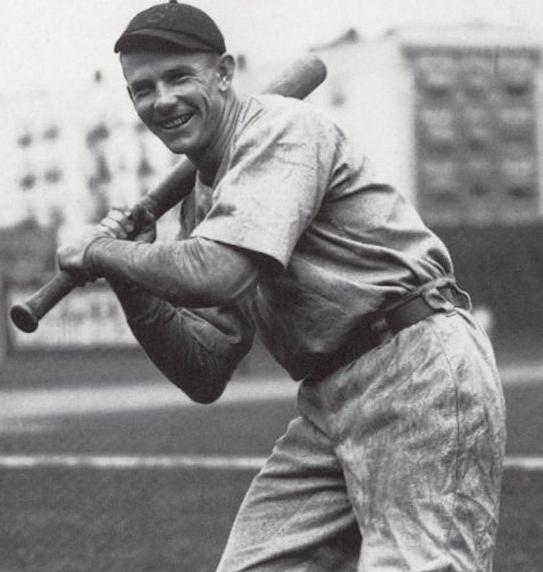 My father has a particular way of referring to the Cleveland Indians.
My father has a particular way of referring to the Cleveland Indians.
If they are looking pretty good, he calls them "his" Indians. If they look to be down and out, they are "your" Indians. Recently, it's typically been, "What do you think about your Indians?" He hasn't committed to whose team they are yet, this season.
One figure from my Dad's youth who was a beloved fixture with "his" Indians was Jack Graney.
John Gladstone Graney, who hailed from Canada, came up to the then-named Cleveland Naps in 1908, the same year that Shoeless Joe Jackson debuted with the Philadelphia Athletics (they would become teammates two years later, when Jackson was dealt to Cleveland). On the field, whenever he heard shouts of his nickname, "Glad", he knew someone from his old neighborhood was in the crowd. Graney was a pitcher, and in spring training showed himself to have a cannon for an arm. However, he was also extremely wild. Tribe player/manager Nap Lajoie (who the team was named after) had Graney throw to several batters. Lajoie later commented that each batter had to wait 5 minutes before he got a pitch to hit. Lajoie himself got in the batter's box, and with Graney throwing as hard as he could to impress the future Hall of Famer, the manager received a beanball, was knocked out cold, and spent the rest of the day with an ice bag on his head. Lajoie told Graney, "Anyone as wild as you belongs in the Wild West. You're going to (Pacific Coast League) Portland." (Voices of Summer, Curt Smith).
 When Graney returned to the big club, Lajoie gave Graney a present: a bull terrier named Larry. This apparently was one incredible dog. No matter at which hotel they were staying, Larry would relieve himself outside at night, make his way to the stairs or an elevator, and find Graney's room. The dog actually found his own way home from the Cleveland area to St. Thomas, Ontario many times. Graney would place him on the shore near a ferry. The dog, by now considered the Tribe's mascot, would get on the ferry, ride to the Canadian shore, and run home. Graney visited the White House in 1913, and President Woodrow Wilson immediately asked about meeting Larry, who had been left at home with a doorman.
When Graney returned to the big club, Lajoie gave Graney a present: a bull terrier named Larry. This apparently was one incredible dog. No matter at which hotel they were staying, Larry would relieve himself outside at night, make his way to the stairs or an elevator, and find Graney's room. The dog actually found his own way home from the Cleveland area to St. Thomas, Ontario many times. Graney would place him on the shore near a ferry. The dog, by now considered the Tribe's mascot, would get on the ferry, ride to the Canadian shore, and run home. Graney visited the White House in 1913, and President Woodrow Wilson immediately asked about meeting Larry, who had been left at home with a doorman.
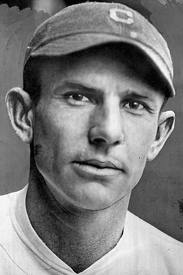 Jack Graney's pitching career may have ended almost before it started, but his career as leadoff-hitting left fielder was better. Although he was not a star, he did have a solid career. He hit some, and typically drew over 100 walks every year. In 1914, Graney became the first batter to face rookie pitcher Babe Ruth (he singled, but was later thrown out by Ruth at the plate in a double play as Graney tried to score). Another interesting item from Graney's playing career was the fact that he was the first player to appear in a game with a number on his jersey (a Yankee myth exposed!). On June 26, 1916, the Indians each had a number pinned to their sleeve, and those numbers corresponded to numbers listed in the scorecard (note to self: memorabilia alert).
Jack Graney's pitching career may have ended almost before it started, but his career as leadoff-hitting left fielder was better. Although he was not a star, he did have a solid career. He hit some, and typically drew over 100 walks every year. In 1914, Graney became the first batter to face rookie pitcher Babe Ruth (he singled, but was later thrown out by Ruth at the plate in a double play as Graney tried to score). Another interesting item from Graney's playing career was the fact that he was the first player to appear in a game with a number on his jersey (a Yankee myth exposed!). On June 26, 1916, the Indians each had a number pinned to their sleeve, and those numbers corresponded to numbers listed in the scorecard (note to self: memorabilia alert).
A roommate of Jack Graney's was Ray Chapman. Tribe fans may know of Chapman as the only player ever to be killed during a game, against the Yankees in August of 1920. Submarine pitcher Carl Mays hit Chapman with a resounding crack which sounded, to many who were present, like a batted ball. The ball rolled back out to the pitcher, who instinctively threw it to first base. It was later discovered that the pitch fractured Chapman's skull, caused a concussion, and broke his neck. Chapman was carried off the playing field of the Polo Grounds to the clubhouse behind center field. Graney later said he had a desperate look in his eyes which indicated a wish to speak. Graney said he gave Chapman a pencil, and Chapman slowly let it drop as he passed away (this is in contrast to another published account which maintains that Chapman died as he was squeezing a pencil while trying to maintain strength). Mays was known as a pitcher who would purposely throw inside to hitters and knock them down, but many thought the beaning of Chapman was accidental. Graney (himself once a wild pitcher, remember) held that it was intentional, even decades later.
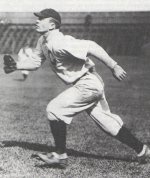 A little-known account of the days following Chapman's death involves a fistfight between Jack Graney and teammate (and future Hall of Famer) Tris Speaker. This stemmed from a dispute over whether Chapman should be buried as a Catholic or as a Protestant. Chapman had been a Protestant, while his wife was a Catholic. She maintained that Chapman had been about to convert. The resulting fight between Graney, a Catholic, and Speaker, a Protestant, resulted in neither being able to attend the funeral due to injuries (at least one account of Chapman's death includes a mention that some players needed a sabbatical from playing due to grief; it is not clear if the players involved extended beyond the two combatants. One may wonder if the main reason for the time off was the fight.).
A little-known account of the days following Chapman's death involves a fistfight between Jack Graney and teammate (and future Hall of Famer) Tris Speaker. This stemmed from a dispute over whether Chapman should be buried as a Catholic or as a Protestant. Chapman had been a Protestant, while his wife was a Catholic. She maintained that Chapman had been about to convert. The resulting fight between Graney, a Catholic, and Speaker, a Protestant, resulted in neither being able to attend the funeral due to injuries (at least one account of Chapman's death includes a mention that some players needed a sabbatical from playing due to grief; it is not clear if the players involved extended beyond the two combatants. One may wonder if the main reason for the time off was the fight.).
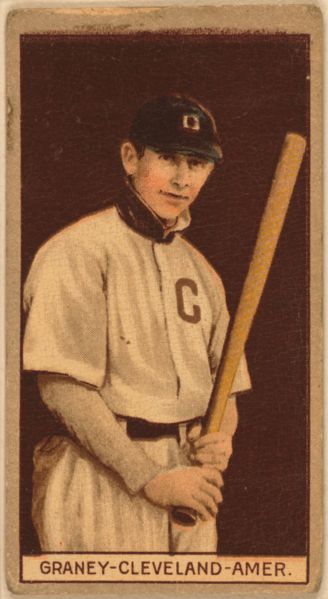 After Jack Graney retired in 1922, he managed a minor league team for a short time and then retired from baseball to run a Ford car dealership. The stock market ahead of 1929 was skyrocketing, and there was a lot of money to be made selling cars. On October 29, however, the market crashed and The Great Depression began, and the car business was no longer a place for many to earn a living. However, the world of radio flourished during this era. Radio receivers were cheap, and programming helped to pass the time.
After Jack Graney retired in 1922, he managed a minor league team for a short time and then retired from baseball to run a Ford car dealership. The stock market ahead of 1929 was skyrocketing, and there was a lot of money to be made selling cars. On October 29, however, the market crashed and The Great Depression began, and the car business was no longer a place for many to earn a living. However, the world of radio flourished during this era. Radio receivers were cheap, and programming helped to pass the time.
In 1931, WHK had the radio rights to the Indians. They also had an opening for an announcer, and the station made Jack Graney the first player-turned-baseball announcer. Announcing play-by-play was the way Graney ultimately found his place in the heart of generations of Cleveland Indians fans.
St. Louis Cardinals Hall of Fame broadcaster Jack Buck was an impressionable fifteen year old when his father relocated from the Northeastern U.S. to Cleveland to take a job with the Erie Railroad. This was in 1939, and Buck later said, "Mr. Graney brought to his job knowledge and controlled enthusiasm. He had a distinctive voice, high-pitched and raspy, but quite clear. You always knew, listening to him, that he knew what was going on and he told it to you simply and accurately." (http://www.findagrave.com/) Buck also said he didn't want to be a policeman or fireman, that Graney made him want to make a living "calling ball."
Respected Plain Dealer sports historian Bob Dolgan called Graney the best announcer the Indians ever had.
Jack Graney's early broadcasts were re-creations. As all good baseball announcers did, he made the game seem live and in-person through his descriptions from the telegraphed accounts he received. At least some of his re-creations were done in an auto showroom, with onlookers watching through plate glass. From Bob Feller's opening day no-hitter in 1940: "Grannie Mack is on the ground with one knee, scrapes it up with his glove hand, flips it over to Trosky at first! A close decision - and he's out! Bob Feller has his first no-hit game! Boy, listen to that crowd!" (Voices of Summer, Curt Smith)
Jack Graney called the 1935 All Star game in Cleveland at the still-new Municipal Stadium, and he also called the 1935 World Series for CBS. One source rates Graney a perfect "10" in the areas of Popularity ("no Tribesman topped him"), Persona ("pathfinder"), and Knowledge ("jock who grasped the game"). "Held lit, but unsmoked, cigarette in booth. ‘It'd burn my hands, but I couldn't puff and talk.'" (Voices of Summer, Curt Smith)
In 1947, Tribe owner Bill Veeck teamed Graney with rookie announcer Jimmy Dudley. In The Golden Voices of Baseball (Ted Patterson, Curt Smith), Dudley is quoted as stating his association with Jack Graney was "one of the greatest I have ever known." It was a magical time for the Tribe in every way - they won the pennant in 1948 after defeating the Boston Red Sox in a one-game playoff, and won the World Series over the Boston Braves in six games. A then-record 2.6+ million fans came out that year; player-manager Lou Boudreau was the American League's Most Valuable Player and rookie knuckleballer Gene Bearden was Pitcher of the Year.
Jack Graney retired after the 1953 season after spending most of 46 years with the Tribe in various roles. Adding to his legacy is the Graney Award, which today honors Canadian sports announcers of note (long-time Detroit Tiger announcer Ernie Harwell was a recipient). In his role as the Tribe's play-by-play announcer, Graney became entrenched as a Cleveland sports treasure in the glory days of the franchise, when my father was a boy and the team was unquestionably "his" Cleveland Indians.
Thank you for reading. Next week: Blast From The Past: Frankie Pytlak. "That's a Good Czech Name, You Know."
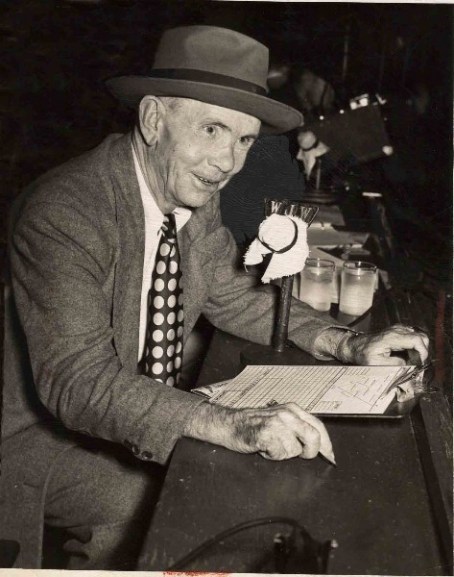
- NBA Announces 2013-2014 Schedule
- Browns Ink Sharknado
- Sharknado A No-Show For Rookie Camp
- Trent Richardson Out Until Training Camp
- Browns Sign Brandon Jackson
- Carrasco Suspended Eight Games
- Browns Add to Wide Receiver Depth with David Nelson
- Browns Need to Learn from Past Draft Mistakes
- Browns Release Chris Gocong and Usama Young
- Browns Missing on Grimes Disappointing, But Not The End
The TCF Forums
- Chris Grant's first 3 drafts
Kingpin74 (Tuesday, January 21 2014 10:13 AM) - The 2014 Offseason Thread
googleeph2 (Tuesday, January 21 2014 9:36 AM) - 2015 Recruiting
furls (Tuesday, January 21 2014 6:57 AM) - Mike Brown
YahooFanChicago (Monday, January 20 2014 11:15 PM) - Movies coming out
HoodooMan (Monday, January 20 2014 9:34 PM) - 2014 Hoops Hockey Hijinx
jpd1224 (Monday, January 20 2014 4:44 PM) - 2014 Recruiting
jclvd_23 (Monday, January 20 2014 2:26 PM) - Wish List - #4 Pick
Hikohadon (Monday, January 20 2014 1:26 PM) - Official- Browns Coach Search/Rumors
OldDawg (Sunday, January 19 2014 6:48 PM) - #1 overall pick Anthony Bennett
TouchEmAllTime (Sunday, January 19 2014 1:28 PM)


